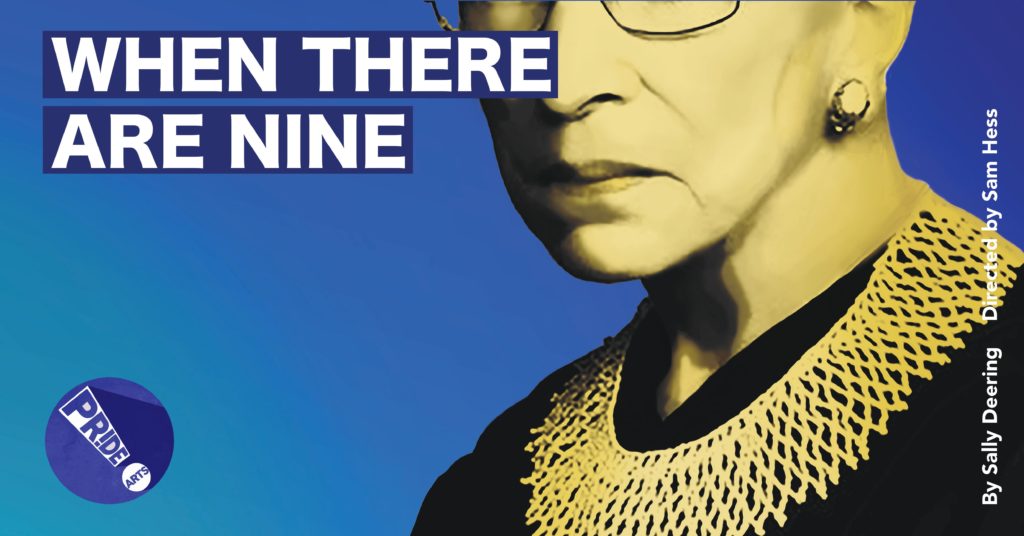
[rating=5]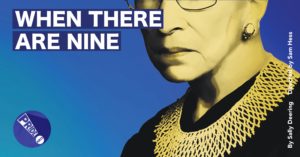 The hottest ticket in town is a dramatized memoir about the life of the late U.S. Supreme Court Justice Ruth Bader Ginsburg (RBG). In this world premiere performance “When There Are Nine”, RBG recalls her personal life, her storied career, and her awesome legacy just before her imminent demise from pancreatic cancer in 2020. This exceptional, highly imaginative “touching dream” play is filled with flashbacks and flashforwards that provide a glimpse into the worldview of this remarkable “Lady Justice” while it establishes the roots of her pioneering achievements in furthering women’s rights and gender parity. Director Sam Hess has crafted a masterpiece based on Sally Deering’s compelling one-of a kind script that depicts a delicate and slight-of-build Brooklyn-born woman who, against all odds, becomes an attorney—top in her class—and ultimately ascends to the nation’s highest court.
The hottest ticket in town is a dramatized memoir about the life of the late U.S. Supreme Court Justice Ruth Bader Ginsburg (RBG). In this world premiere performance “When There Are Nine”, RBG recalls her personal life, her storied career, and her awesome legacy just before her imminent demise from pancreatic cancer in 2020. This exceptional, highly imaginative “touching dream” play is filled with flashbacks and flashforwards that provide a glimpse into the worldview of this remarkable “Lady Justice” while it establishes the roots of her pioneering achievements in furthering women’s rights and gender parity. Director Sam Hess has crafted a masterpiece based on Sally Deering’s compelling one-of a kind script that depicts a delicate and slight-of-build Brooklyn-born woman who, against all odds, becomes an attorney—top in her class—and ultimately ascends to the nation’s highest court.
The casting is brilliant. Talia Langman plays the honorable RBG incredibly! Langman even looks like the late justice, and she nails RBG’s contemplativeness and mannerisms to a T. The ease by which she transitions from the RBG of the present moment into the Ruth of the past—and back and forth again—is lovely and never confusing, even with the bare minimum of costume changes. Mostly we see Ruth in her younger years minus her famed glasses, and RBG in her older years wearing them. Gabe Estrada’s portrayal of her husband Martin Ginsburg (Marty), with his encouraging manner and kind smile, is done with finesse. The interaction of these two characters could not be any better; their loving relationship is palpable.
The story begins when RBG is suffering from her latest painful bout with cancer and getting a new caregiver named Gabby (Nicholia Q. Aguirre), who carries a heavy mailsack of letters into her home. In short order, we see a flashback from childhood: “Don’t be sorry; be someone,” says Ruth’s mother Celia Bader, who passes away just before Ruth graduates from high school. This phrase frames the entire performance; it is shorthand for how a loving mother has provided the incentive and inspiration for her daughter to attend college and then law school. We also witness Ruth’s strong reaction to inflexible proscriptions regarding a woman’s place in society within Jewish Orthodoxy that made her rebel against this aspect of religious tradition and paved the way for her later feminism.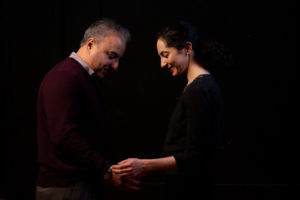
“When There Are Nine” takes its name from a statement that RBG once made: that the only time when women will achieve equality and parity with men in this country is when nine women will serve together on the U.S. Supreme Court. Therefore, as an interesting twist, women play all the male judges and justices from the past; and, in accordance with the title of the show, they play the nine female justices presaged for a future court. The law students, judges, justices, and supporting characters are depicted by ensemble members Shannon Bachelder, Hannah Bouitlier, Ginger De Leon, Sarah Kinn, Zoe Nemetz, Ashlyn Seehafer, and Caitlin Wolfe.
Connor Sale has done a great job with the lighting and projection design, especially in the smattering of vintage footage, which provides a historical touch to RBG’s life and gives the audience some sense of time and place. Katelyn Sutton, the costume designer, has created appropriate but simple costumes for all of the characters. I especially like the plain white blouse and black slacks that Langman wears throughout most of the performance. An added feature is an ornamental rainbow-colored lace collar, or jabot, on RBG’s judicial robe later on in the show. (Note that RBG used to wear many different kinds of collars—made with fiber or beadwork or some combination thereof—to express being in the majority or in dissent or to advocate for various causes she felt strongly about.) Props designer Jeff Brain has introduced an adequate number of props into a minimalist set by Valeriya Nedviga, just enough to tell the story on a relatively small stage in a storefront theater (which, incidentally has been thoroughly remodeled since the last time I visited before COVID).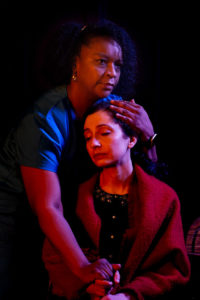
Practically from the beginning, the audience is drawn ever so tightly into this biography that we gain a personal stake in it. Deering’s script is insightful and awe-inspiring; the stage direction is marvelous; and the acting is great. The words in this drama may not be exactly what RBG might have used, but they are exactly what she might have meant, and this is a credit to the playwright! If you are already acquainted with the basic story of RBG’s life through such movies such as “On the Basis of Sex” and “The Notorious RBG”, you are in for a treat, because this play will only add to your knowledge. At the same time, it provides a great introduction to the life of the late justice for those as yet unfamiliar with it. In fact, the production is so good that it will motivate you to learn more about her background and steely determination to become a champion of the law and to further the pursuit of justice. And a word of warning: This tale is a tear-jerker, and that makes it even more enjoyable! As you celebrate RBG’s personal and professional milestones, you will be crying; you will be smiling; you will be kvelling—and please look that one up, my non-Jewish friends! And don’t worry if you don’t catch all references to Jewish tradition: this will not affect your appreciation of the story, as some portion of it is explained rather nicely. But if you already know something about Judaism, the show becomes even more profound.
RBG’s successes in advocating for the human rights of all persons, regardless of sex, gender, or sexual orientation parallels our nation’s progress in advancing the rights of all. Her story can serve as a template for each and every one of us to act on our inclinations, live up to our aspirations, and become activists in our own communities in support of those who have been discriminated against or who are otherwise less fortunate or less privileged than we are. It is also a harsh reminder that successors must pick up the mantle of important causes which are worth fighting for and finish the job that their forefathers and foremothers have started.
This world premiere performance is a winner and is destined to go places. The entire spectacle is so powerful that it takes awhile to absorb everything and digest it all. I felt incredibly privileged to have been in the audience and would have seen the show twice in one week if I had the chance. The guest I took to opening night wanted me to rate it ten stars; and right after the performance, she immediately purchased a ticket to see it again. So if there is any one show that you should take in right at this moment, this is it! I suggest that you buy a ticket ASAP, or you will be extremely envious of all those who get to see the production more than once—and you didn’t!
“When There Are Nine” is playing through March 13, 2022 at The Broadway, Pride Arts Center at 4139 N. Broadway Avenue, in Chicago.
Tickets are $30. Seniors and students receive a $5 discount.
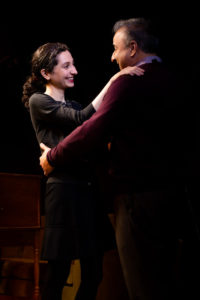 Performance schedule:
Performance schedule:
Thursdays, Fridays, Saturdays – 7:30 p.m.
Sundays – 3:00 p.m.
For additional information and to purchase tickets (and to learn about some pay-what-you-can performances), please go to: https://pridearts.org/when-there-are-nine-a-dream-play-about-ruth-bader-ginsburg/.
Please note that Pride Arts Center is a relatively small venue. Many performances are already sold out, so buy your tickets now!
Pride Arts is also a participant in Chicago Theatre Week, February 17-27. To find out more and to purchase discount tickets for performances at this and other Chicago theatres (with code #CTW22), visit https://pridearts.org/when-there-are-nine-is-part-of-chicago-theater-week/.
For general information about Pride Arts and to learn more about them and their other offerings, see https://pridearts.org/.
Note that COVID protocols are in effect for all performances. Audience members must provide proof of vaccination and a photo ID upon entering and must wear a mask indoors at all times that covers their mouth and nose.
To see what others are saying, visit www.theatreinchicago.com, go to Review Round-Up and click at “When There Are Nine”.






More Stories
“The Firebugs” reviewed by Julia W. Rath
“The Book of Grace” Al Bresloff with another from Paul LIsnek
“The Last Five Years” MILWAUKEE